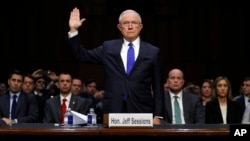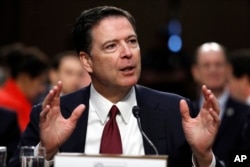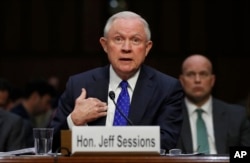U.S. Attorney General Jeff Sessions on Wednesday declined to discuss his conversations with President Donald Trump concerning the Russia probe and defended the president's immigration agenda in often-heated exchanges with lawmakers on Capitol Hill
"I will not be able to discuss the content of my conversations with the president," Sessions said in his first appearance before the Senate Judiciary Committee since becoming America's top law enforcement officer.
The attorney general stuck to that response that a president's private conversations are privileged as Democratic senators repeatedly sought answers about what Sessions and Trump might have discussed pertaining to the Russia investigation, as well as the firing of former FBI director James Comey.
Sessions did, however, tell senators that he has not been interviewed by Robert Mueller, the special counsel investigating Russian attempts to influence the 2016 U.S. election. Asked whether he has confidence in Mueller's work, the attorney general was noncommittal.
"The process has to work its will … history will judge," Sessions said.
Trump has criticized the special counsel's probe as a "witch hunt" and berated the attorney general for recusing himself from the Russia investigation.
On other topics, Sessions spoke far more freely. He vigorously defended President Trump's decision to end a program that has shielded undocumented immigrants brought to the United States as children from deportation, and he said so-called "sanctuary cities" that refuse to cooperate with federal officials in identifying undocumented people deserve to lose federal funding.
In both cases, Sessions said Trump is correcting "an erosion in respect for the rule of law."
Senators of both parties pushed back. Republican Thom Tillis of North Carolina challenged Sessions on the president's decision to sunset the Obama-era Deferred Action for Childhood Arrivals program, known as DACA, unless Congress enacts a new program into law.
"Does anybody really want to throw out good, educated, and accomplished young people who have jobs, some serving their country, brought to this country through no fault of their own?" asked Tillis, who has co-authored legislation to benefit DACA recipients.
"I say that it cannot be the policy of the United States that one can bring a young person [illegally] in the country, and they can't be deported," Sessions responded, adding that Trump wants DACA recipients to be dealt with "compassionately" as part of a larger package of immigration reforms and measures to boost U.S. border security.
Trump often has pledged to build a wall between the United States and Mexico. Asked whether he expects a barrier to be constructed spanning the entire 3,000-kilometer U.S.-Mexico border, the attorney general said, "No, the president has made clear he doesn't expect that."
Sessions, who represented Alabama in the Senate before becoming attorney general, came under fire from former Democratic colleagues for asserting during his confirmation hearing that he had no contact with Russian officials during last year's campaign. Sessions, who backed Trump and served as a campaign surrogate, later admitted to having met with Russia's ambassador on several occasions.
"The ambassador from Russia is Russian," Democratic Senator Al Franken of Minnesota said pointedly.
"I conducted no improper discussions with Russians at anytime," Sessions insisted.
The attorney general testified hours after Trump posted a series of tweets blasting Comey once again for the FBI's probe of Democrat Hillary Clinton's handling of emails. Clinton, a former secretary of state, was Trump's 2016 election challenger.
Earlier this year, Comey testified that, before firing him, Trump repeatedly pressured him to wrap up the Justice Department's Russia investigation, wanting him to "lift the cloud" surrounding the inquiry.
"Did the president ever mention to you his concern about lifting the cloud' on the Russia investigation?" asked the committee's top Democrat, Dianne Feinstein of California.
"Senator Feinstein, that calls for [revealing] a communication that I've had with the president, and I believe it remains confidential," Sessions responded.
Ken Bredemeier contributed to this report.






